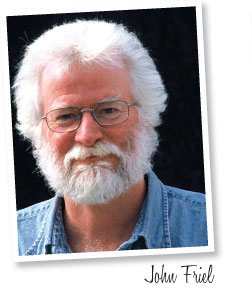4/1/2021
Pencil Me In
John Friel

In 1958, in an essay entitled “I, Pencil,” Leonard Read wrote, “Not a single person on the face of the earth knows how to make” that humble writing implement that sells for pennies.
Which sounds improbable, but it’s true. It takes a global village of specialists to craft a #2 pencil. Looking at that yellow stick, you don’t see the loggers in Oregon, graphite miners in Sri Lanka, Mississippi River mud dredgers, rubber tree tappers, metallurgists and oilfield roughnecks. But they all contributed.
Somewhere in many a retail flower shop hangs a little sign that reads, “If people only knew ... they wouldn’t complain about the price of a flower.” Between those phrases is a litany of what goes into making a living thing of beauty: weeks of sunshine, gallons of water, pounds of fertilizer, hours of labor.
Read’s essay could as easily trace the creation of a gallon perennial: “I, Penstemon.” No single person on earth can get that plant onto your garden center bench, or off it and into a home garden. It takes a global village.
Behind every pot and seed packet is a paper or digital trail of purchase orders, bills of lading, invoices, inspections, germination tests, phytosanitary certificates, permits, pick lists and receipts stretching halfway around the world. Sign here. And that’s just the plant, not the media, container or POP.
In that SKU’s shadow are seed companies, farmers, trial gardens, thousands of discarded crosses. An explorer brought that species out of the wild, breeders tamed it, a marketing team photographed, named and described it, a lawyer wrote the patent and/or trademark application.
As with Read’s pencil, “(Not) a single person ... contributes more than a tiny bit of know-how.”
My employer is a propagator. We consider ourselves Point A, the origin of many of those finished plants that magically fill your GC every spring. It’s mostly true of starters rooted from our stock or field-dug divisions, but even the ancestors of those source plants came to us from elsewhere.
Our industry is multi-layered, specialized and global. Our other starters rely on seed companies, TC labs and offshore URC farms. I’ve visited labs and seed houses, and was impressed by their cleanliness and quality control. It’s no accident that pharmaceutical firms branch out into hort. Seeds, pills—much of the machinery can handle either.
I recently sat in on a Zoom panel conference organized by the National Garden Bureau, with representatives from six seed companies dealing in both ornamentals and edibles.
If people only knew: We ship all over North America, navigating too many complexities to list. These firms grow, or contract with growers, in various parts of America, but also China, Thailand, Chile, India, Turkey and more.
Seeds cross multiple nations and states, each with its own regulations. COVID complicates warehouse operations, with shifts added and crews distanced. Shipping is fraught. Products languish at sea, imprisoned on container vessels that can’t dock to unload. When they finally land, they’re subject to scrutiny and delays. “I sent something overnight two weeks ago,” someone lamented, “and it’s still not there.”
Last year’s retail seed shortages were mostly felt in edibles. This year, it’ll likely affect ornamentals, too. But it’s not like there won’t be any carrots or any campanulas; customers just may not find the exact variety they’re used to.
Like pencils, seeds fetch a tiny price each. But in the right hands, one humble pencil, or one dust-like seed, can create something of stunning beauty. And as one panelist said, “It’s good for the soul to plant something and watch it grow.”
If people only knew. GP
John Friel is marketing manager for Emerald Coast Growers and a freelance writer.